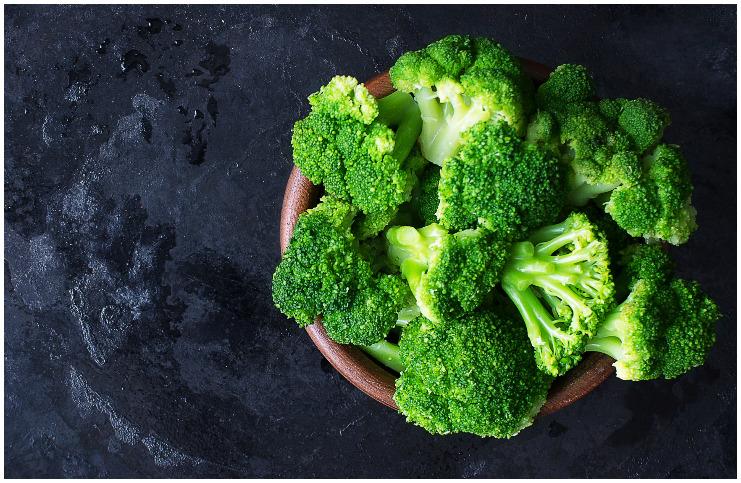Broccoli
It is one of those remarkable vegetables whose benefits will convince you to consume it regularly, and more and more people do.
For example, over the last three decades, consumption of this cruciferous per person has increased from approximately 1.4 pounds in 1980 to about 5.6 pounds in 2010, according to USDA’s Economic Research Service.
Nutrition Facts
It is an excellent source of dietary fiber, calcium, protein, iron, vitamin C, magnesium, vitamin A (in the form of carotenoids), phosphorus, vitamin E, vitamin K, chromium, thiamin, pantothenic acid, niacin, folate, potassium, manganese, selenium, and zinc.
Health Benefits
Excellent Source Of Sulforaphane
One of this cruciferous’ claims to fame is sulforaphane, an organic sulfur compound also found in cabbage, Brussels sprouts, horseradish, cauliflower, and arugula. According to research, sulforaphane prevents the development of glucose intolerance as well as lowers blood glucose (sugar) levels as much as metformin (the most used medicine by type 2 diabetics).
Moreover, a recent study conducted by John Hopkins concluded that sulforaphane is very effective in killing H. pylori bacteria, a type of bacteria that infects the stomach.
Note – cooking this vegetable destroys myrosinase (part of a plant’s natural defenses), an enzyme that we need to fully absorb the sulforaphane.
Cancer Prevention
Regular consumption of this cruciferous can help the human body detoxify carcinogens, which actually may reduce the risk of developing liver cancer, according to scientists from Bloomberg School of Public Health and Johns Hopkins University School of Medicine.
Moreover, compounds in this vegetable are capable of preventing the relapse of certain cancers by destroying cancer stem cells, as per a study that was done at South Dakota State University. It is also high in glucoraphanin which is transformed by the body into raphanin, a compound capable of preventing cancer.
Healthy Pregnancy
Another important health benefit of this cruciferous is that it has one of the highest amounts of iron out of any cruciferous, making it amazing for blood health since this mineral is responsible for transporting oxygen in the red blood cells.
An iron deficiency during pregnancy increases the chances of impaired cognitive or behavioral development in infants, low birth weight, and premature birth.
Skin Health
This vegetable is rich in fiber content, one of the most versatile and valuable nutrients around. For instance, fiber helps to lower LDL and total cholesterol levels, normalize bowel movements, control blood sugar, aid in achieving a healthy weight, and maintain bowel health.
Strong Bones
It is also rich in calcium, an essential mineral that strengthens the hair follicles. More importantly, this mineral is vital to proper body function and for healthy teeth and gums. In combination with vitamin K, calcium keeps the bones healthy and safe from developing conditions, like – osteoporosis.
Side Effects
There are no scientifically proven side effects.
Spinach
It is one of the healthiest vegetables which we can include in our regular diet. This vegetable belongs to the Amaranthaceae family food group, which also includes other nutrient-dense plant foods, like – Swiss chard, beets, and quinoa.
This dark leafy vegetable can be added as an ingredient to a variety of dishes and can either be served raw or cooked.
Nutrition Facts
It is high in folate, niacin, protein, vitamin A, dietary fiber, vitamin B6, vitamin E, vitamin C, vitamin K, potassium, thiamin, pantothenic acid, manganese, zinc, riboflavin, magnesium, selenium, iron, and calcium. Spinach contains many plant compounds that can improve overall health such as – kaempferol, lutein, quercetin, nitrates, and zeaxanthin.
Health Benefits
Prevents Cataracts
1/2 cup of this vegetable has about 190% of the recommended daily intake of vitamin A, in the form of health-promoting carotenoids (including – lutein, beta-carotene, and zeaxanthin). These phytochemicals have potent anti-cancerous and anti-inflammatory properties and are beneficial for healthy eye-sight, also preventing cataracts and macular degeneration.
Reduces Free Radical Damage
The flavonoids found in this dark leafy vegetable have been shown in numerous studies to help combat some types of cancers, such as – prostate, breast, and ovarian cancer.
These flavonoids also have antioxidant properties and reduce the negative effects of free radicals, which are acknowledged to cause age-related conditions like glaucoma and negatively impact vision. They also boost concentration and prevent neural decline.
Boosts The Immune System
A 100-gram serving of this remarkable vegetable has about 28.1 mcg of vitamin C, which is 34% of the recommended daily intake, according to the United States Department of Agriculture.
The benefits of vitamin C for human health may include protection against cardiovascular disease, immune system deficiencies, gallstones, eye disease, prenatal health problems, and skin wrinkling.
Side Effects
There are no scientifically proven side effects.
Broccoli vs Spinach – Which Has A Better Nutritional Profile?
Both these amazing vegetables have a similar nutritional profile, but this contest is won by spinach due to its increased level of vitamin A, vitamin K, folate, manganese, potassium, iron, calcium, and magnesium.
Images credit – Shutterstock
READ THIS NEXT: Broccoli vs Cauliflower
